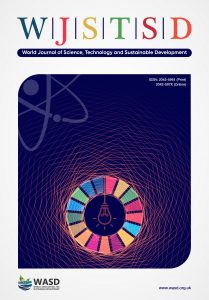Towards sustainable indicators of food and nutritional outcomes in India, Amarender Reddy, Radhika Rani, Timothy Cadman, Soora Kumar and Anugula Reddy
 A. Amarender Reddy
A. Amarender Reddy
Indian Agricultural Research Institute, New Delhi
India
Email: anugu.amarender.reddy@gmail.com
Ch. Radhika Rani
National Institute of Rural Development and Panchayati Raj, Hyderabad
India
Timothy Cadman
Institute for Ethics
Governance and Law, Griffith University, Nathan
Australia
Soora Naresh Kumar
Centre for Environment Science and Climate Resilient Agriculture
Indian Agricultural Research Institute, New Delhi
India
Anugula N Reddy
National University of Educational Planning and Administration, New Delhi
India
DOI: 10.1108/WJSTSD-10-2015-0049
Purpose: The purpose of this paper is to measure performance of India in food and nutrition security relative to other Asian countries like Bangladesh, China, Africa and also developed countries from 1991 to 2016.
Design/methodology/approach: The study is based on FAO food security indicators under four dimensions, namely, food availability, access, stability and utilization. These indicators are further categorized into determinants and outcome indicators of food security. A comprehensive fifteen indicators are examined in depth.
Findings: Food availability in terms of dietary calories and protein per capita was less in India compared to even Africa and Bangladesh. However, food access indicators like road density is better, food prices remain low and stable, which improved food access and stability. However, in utilization indicators, access to water and sanitation remained low, anaemia among pregnant women and undernourishment was relatively higher when even compared to least developed countries like Africa and Bangladesh. Depth of food deficit (an indicator of severity of food deficit) was higher in India except Africa.
Research limitations/implications: Future research should focus on policies for decreasing undernourishment and anaemia and severity in depth of food deficit with focus on India.
Practical implications: The results highlight the severity of food deficit and anaemia among women, undernourishment and provide benchmark to monitor sustainable development goals in zero hunger goal.
Originality/value: This study examined the relative performance of India in various food and nutrition security indicators in comparison to other countries.
Keywords: India; Food security; Nutrition security; Sustainable development goals.
Citation: Reddy, A.A., Rani, C.R., Cadman, T., Kumar, S.N. and Reddy, A.N. (2016), "Towards sustainable indicators of food and nutritional outcomes in India", World Journal of Science, Technology and Sustainable Development, Vol. 13 No. 2, pp. 128-142. https://doi.org/10.1108/WJSTSD-10-2015-0049

